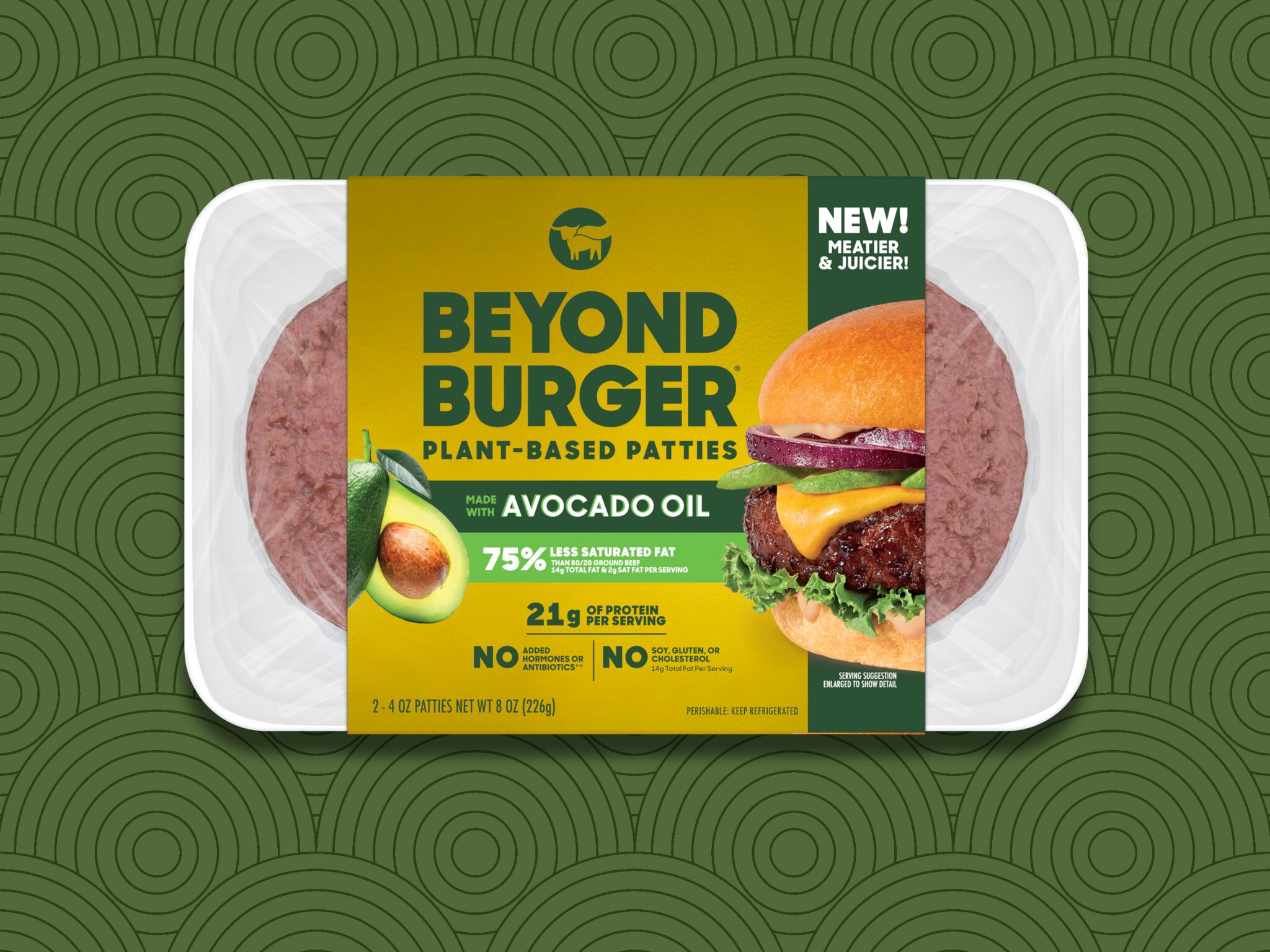Beyond Meat IV: Meatier, Healthier & Costlier Plant-Based Burgers
9 Mins Read
Californian plant-based giant Beyond Meat has unveiled its first beef product reformulation in three years, with the Beyond IV burger and mince now featuring avocado oil, fava beans and lentils. It’s a more nutritious product, but it’s also more expensive.
Beyond Meat is reformulating its mince and burger SKUs to match consumer demands for better-tasting and healthier plant-based meats, which will roll out in the US this spring.
Fuelled by the fourth generation of its core beef platform, the new Beyond Burger and Beef will replace the existing iterations on retail shelves, and their launch is headlined by improved nutritional credentials. There’s less saturated fat, less sodium, more calcium, more potassium, and slightly more protein.
The El Segundo-based company has now bid adieu to canola and coconut oils, replacing them with avocado oil. Plus, it has added fava beans and red lentils to its ingredient list, marginally shortening the ingredient list from 18 to 17. All this plays into key consumer concerns and demands: research has shown that people want better-tasting vegan burgers that are also better for their health.
Beyond Meat’s revamp comes with the backdrop of heightened criticism around the additives, ‘unnatural’ ingredients and ultra-processing used in meat alternatives. To ensure that its claims live up to scrutiny, the company worked with medical and nutrition experts in a multi-year research effort to improve its offerings and meet guidelines set by national health bodies and experts.
“We’re incredibly proud of what we’ve accomplished with Beyond IV as it marks our most significant renovation and step forward to date,” Shira Zackai, the company’s chief communication officer, told Green Queen. “As part of Beyond Meat’s rapid and relentless approach to innovation, we’re always working to advance the taste and nutrition of our products.”
Beyond Meat IV means more nutritious plant-based beef
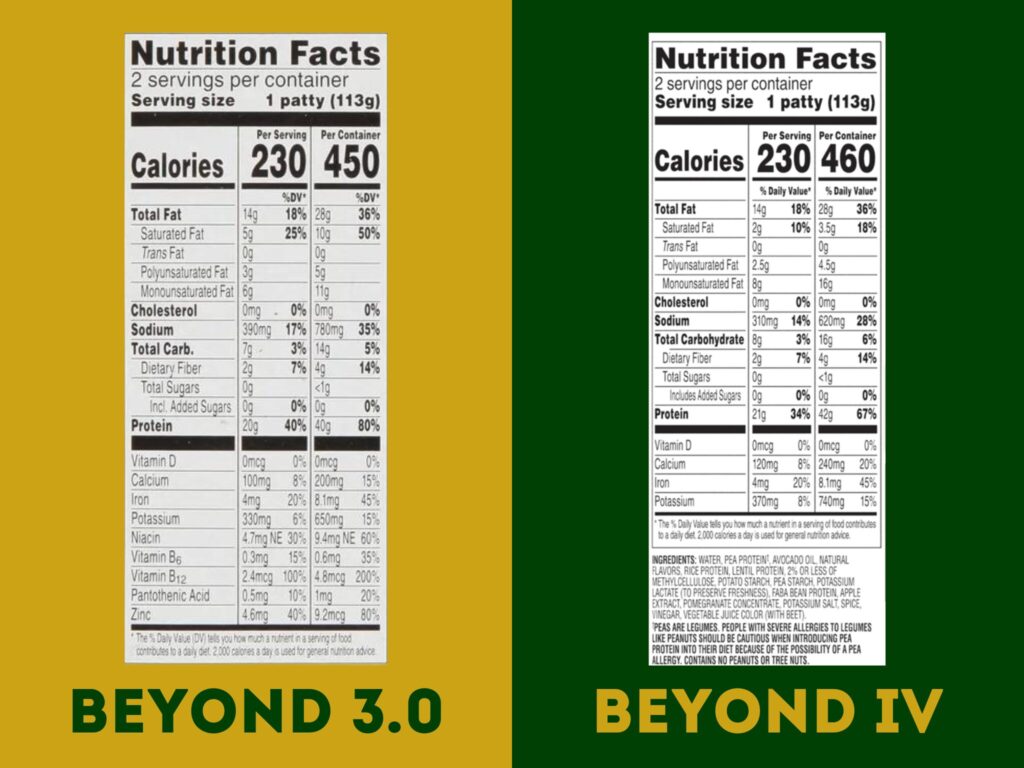
In the last year, brand strategies for plant-based meat have shifted drastically. There’s a bigger focus on health than ever before, in direct response to consumer attitudes and concerns about vegan alternatives. In August, with its first marketing campaign in years, Beyond Meat opted to subtly push back against targeted attacks from meat industry lobby groups, shining a light on the farmers who grow its ingredients.
However, it quickly changed tact two months later, with a new marketing drive honing in on its steak product, which was certified as ‘heart-healthy’ by the American Heart Association (AHA). It has continued that rhetoric, as has its biggest rival, Impossible Foods.
“There is a considerable gap between the strong health credentials of our products and a broader counternarrative that is now afoot, and this gap appears to have widened,” Beyond Meat CEO Ethan Brown said in its Q2 earnings call. “This change in perception is not without encouragement from interest groups, who have succeeded in seeding doubt and fear around the ingredients and processes we use to create our and other plant-based meats.”
In retrospect, this served as a precursor to today’s announcement. Behind the scenes, Beyond Meat has been intent on answering critics of plant-based meat, and the belief is that its newest products are its strongest response yet. The Beyond Burger IV is an upgrade on the existing one on multiple counts: there’s 60% less saturated fat (2g per serving), 20% less sodium (310mg), 20% more calcium (120mg), and 12% higher potassium content (370mg).
Plus, the new Beyond Beef has 21g of protein, a gram more than its predecessor. This, by the way, is higher than most 80/20 beef products on the market. The company claims the saturated fat content is 75% lower than standard 80/20 beef too.
“The development of the new products occurred within an ecosystem of leading medical and nutrition experts, and were designed to meet the standards of national health organisations to create a product that delivers the taste, satisfaction, and utility of 80/20 beef – yet is demonstrably healthier,” said Beyond Meat CEO Ethan Brown.
The company has been able to do so by rejigging its ingredient list. Gone are the canola and coconut oils – the former is a seed oil that has high amounts of linoleic acid, which has been linked to inflammation and related diseases, while the latter is a fat infamous for its high saturated fat content. With avocado oil, there’s less saturated fat, less linoleic acid, and more monounsaturated fat (also known as one of the healthier fats). The new products have 8g of the latter, versus 6g in the 3.0 versions.
Half of Americans found plant-based meats to be healthy in 2020, but that dipped to 38% in 2022. The loss in faith has since continued, with a Mintel survey from last year showing that nutrition is the second-biggest reason (35%) for Americans’ reticence to try meat alternatives. Yet another poll revealed that health is the major factor behind Americans eating meatless diets, with six in 10 choosing it.
Beyond Meat’s beef is now recognised by the American Diabetes Association’s evidence-based nutritional guidelines for its Better Choices for Life programme, and now features Good Housekeeping’s Nutritionist Approved Emblem. Unlike its steak, the ground beef and burger aren’t yet certified by the AHA, but they have been included in a catalogue of ‘heart-healthy’ recipes by its Heart-Check initiative.
All this will no doubt appeal to a country where one citizen dies from cardiovascular disease every 33 seconds, over a third are clinically obese, and over 11% suffer from type 2 diabetes.
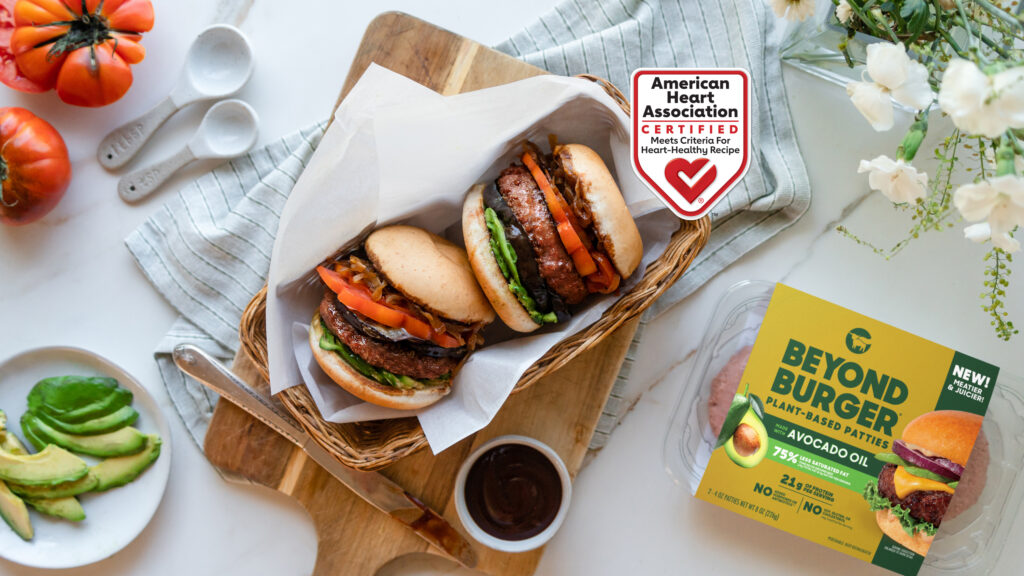
Beyond Meat leans into the whole-food trend, but there’s a snag
The other major additions to Beyond Meat’s mince and burger are fava beans and red lentils. The company joins a raft of others incorporating whole foods into their plant-based offerings, playing into a trend connected to the increased consciousness around health and ultra-processed foods.
Among different protein sources, those originating from whole plants experienced the sharpest rise in consumption among Americans between 2022 and 2023, with 28% eating them ‘somewhat’ or ‘much more’. These foods also had the second-lowest drop (11%) in intake, behind plant-based meat and seafood analogues (10%).
There is a lot of misconception about ultra-processing and plant-based meats, with consumers linking the former with healthfulness to explain their dismay about the latter. This outlook chimes with “concerns some people have around foods that are new – often called food neophobia“, Churchill Fellow Jenny Chapman told Green Queen earlier this month. “Some [marketing] campaigns really hone in on this, by using words like ‘fake’ and ‘unnatural’ to describe plant-based meats (which are safe, nutritious foods).”
With fava bean, pea protein and avocado oil, Beyond Meat is aiming to appeal to people looking for clean-label foods. Research by ingredients supplier Ingredion has found that 78% of consumers would spend more money on products with ‘natural’ or ‘all-natural’ packaging claims.
It’s important to note that there’s no agreed definition for what constitutes a ‘clean-label’ food, though the common understanding is that it means there are fewer ingredients and fewer ultra-processed elements. The 17-ingredient Beyond Beef and Burger IV don’t suggest they meet the former criterion, but the removal of ‘expeller-pressed canola oil’ and ‘refined coconut oil’ indicates they could fit the latter.
Backing up this claim is a Clean Label Project certification, the first such accreditation for plant-based meat – although the initiative is more focused on screening products for environmental toxins and ingredient quality.
However, there is one drawback with the inclusion of fava beans: it makes Beyond Meat products more susceptible to allergies. Estimates suggest that around 4% of the world’s population have favism, a genetic disorder characterised by allergy-like reactions to these beans. The company did not respond to Green Queen’s query about whether the inclusion of fava beans raised any internal concerns about allergies.
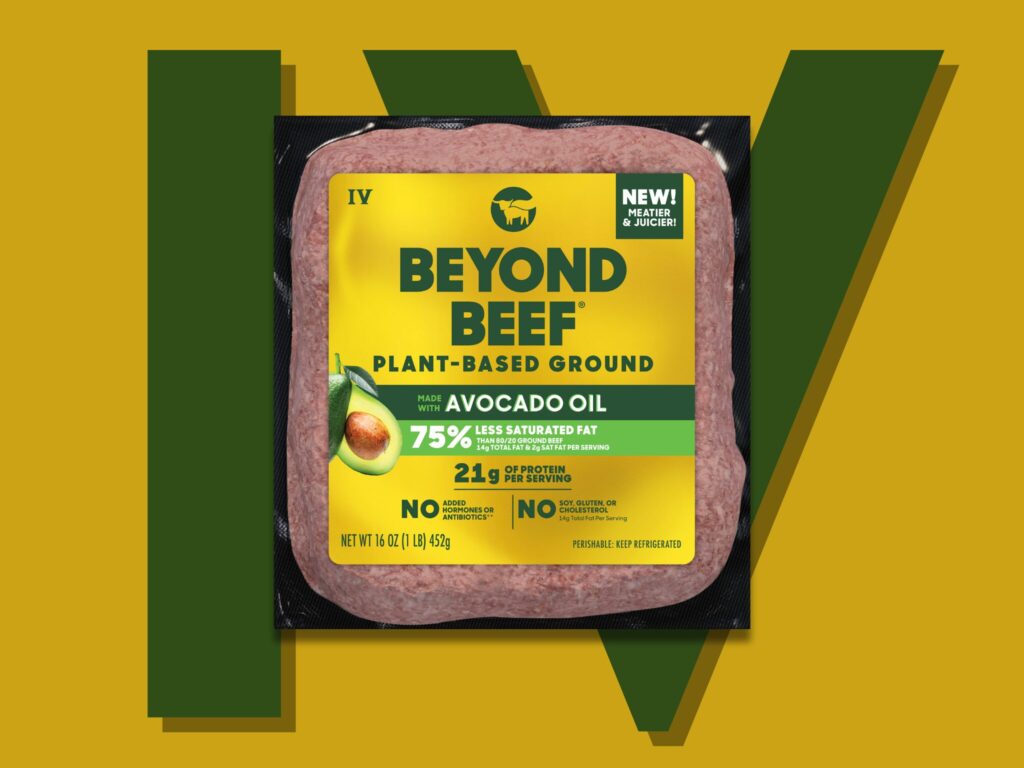
Avocado oil pits flavour against cost
Using avocado oil doesn’t just come with health gains – it opens up more culinary attributes too. This is important: flavour is by far the biggest deterrent and attraction for alt-meat consumption. This is illustrated by an international survey from 2022, which suggested that plant-based meat’s taste and texture are as important as their conventional counterparts for over 75% of consumers. And remember that Mintel poll from above? Nutrition was second on the list to flavour, which drives 48% of consumers away from these products.
But by using this fat, Beyond Meat is hitting the taste vertical, with the neutral flavour and smoother mouthfeel allowing it to “unlock an even meatier, beefy flavour” for the new products. Plus, given avocado oil has a higher smoke point of any fat (270°C/521°F, versus 230°C/446°F for canola oil, on average), the new Beyond Beef is designed to sizzle and barbecue better.
If you’re worried about the change in ingredients meaning a change in your beloved Beyond Burger’s flavour, fret not. A 93-person taste test last September indicated that consumers preferred the meatier taste and texture of the new vegan beef. And at last month’s FoodFluence conference in Edinburgh, 29 out of 31 registered dietitians said they enjoyed the taste of the new Beyond Burger, found it healthful, and would recommend it.
“We are excited to be adding more nutrient-dense plant-based ingredients including red lentil and faba
bean protein in the Beyond IV platform,” Zackai told Green Queen. “The interplay of the proteins with the avocado oil allowed us to deliver our meatiest product yet while significantly advancing the nutritional benefits.”
Moreover, according to its latest life-cycle assessment, the Beyond Burger 3.0 generates 90% fewer GHG emissions, requires 37% non-renewable energy, uses 97% less land and consumes 97% less water than a conventional 80/20 quarter-pound beef patty produced in the US. But the reformulation doesn’t necessarily signal a shift in Beyond Beef’s environmental credentials. “While more research is still needed, we don’t expect there to be a significant change,” she said.
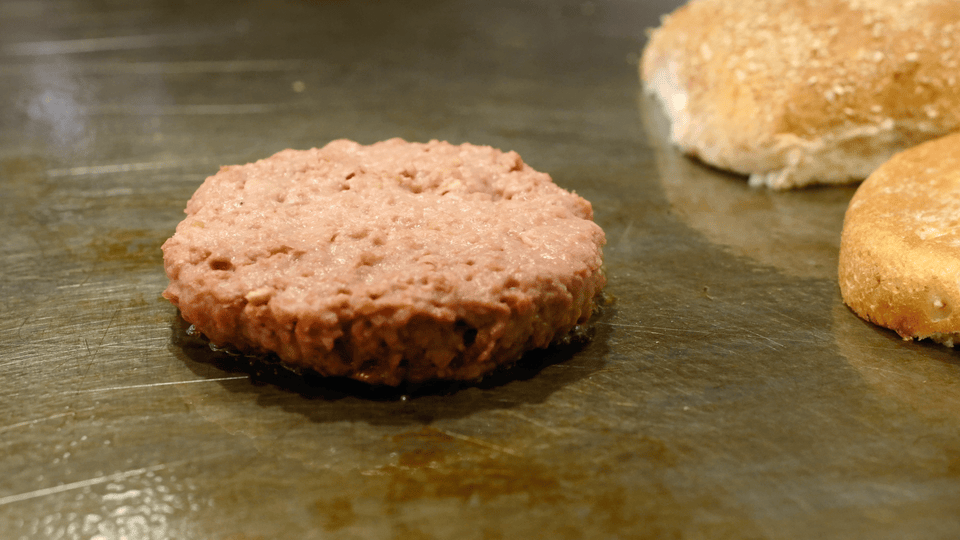
Okay, taste? Check. Nutrition? Check. Sustainability? Check. Price? Well.
We’re in an era of increased cost of living, and people are looking for wallet-friendly food. In the UK, inflation has bitten plant-based meats already. While Beyond Meat’s yearly accounts are due next week, the company’s previous financials have shown that it struggled last year, with a 26.5% sales fall in Q3 (over already declining sales in the previous quarter) forcing it to lay off more staff and cut back its full-year forecast.
There was always going to be one major issue with avocado oil – for all its benefits, it’s significantly more expensive. So, Beyond Meat had to make a decision: absorb the added costs, or pass them on to the consumer. “As avocado oil is a more premium ingredient, the new platform will be priced to reflect that,” revealed Zackai. “However, based on the significant nutritional benefits and elevated taste profile of these new products, we feel confident in the value we will be providing to consumers relative to their cost.”
So, it’ll be interesting to see whether consumers really are willing to pay more for healthier, tastier meat alternatives. The new products are initially exclusive to retail, and their foodservice path remains unclear. “It will be available at all retailers where the Beyond Burger and Beyond Beef are currently sold, replacing the previous version in grocery stores,” confirmed Zackai. “We are excited to get these products into the market and clearly communicate these benefits to consumers, so they can make a choice that not only tastes great, but is substantially better for them and the planet.”
Could platform IV be a catalyst for the year 2024 for Beyond Meat?

